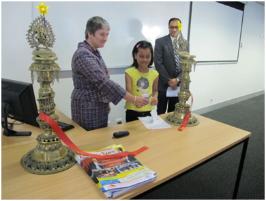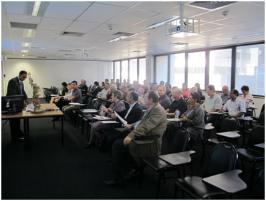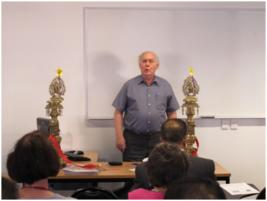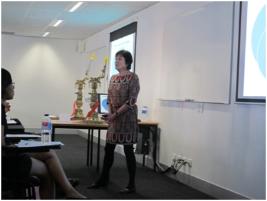CQUni engages with Nepalese Association
Published on 22 May, 2013
CQUniversity has been engaging with the Nepalese Association of QLD Inc (NAQ) since 2006. Brisbane Campus staff member Kamal Gurung* explains how...
NAQ was established in 2006 with the aim to promote Nepalese Culture within Australia and to help fellow members at a time of need. NAQ Inc has established a Nepalese Language Centre to educate the second generation of people of Nepalese origin about Nepalese culture and to teach the Nepali language and culture to interested community members.

Senator for Qld Claire Moore cuts the ribbon to open the Nepal Australia Studies and Research Centre at Brisbane Campus
NAQ closely works with the Business Manager and Student Services at CQUniversity Brisbane to assist Nepalese students studying at the campus to acclimatise to the new environment and to provide welfare-related services to ensure their stay in Australia is as smooth as possible. NAQ organises cultural programs where students are invited to take part, as well as mentoring services.
CQUniversity Brisbane has assisted NAQ by providing classrooms for their programs (such as the Nepalese Language Centre) and formal meeting rooms and by sponsoring their cultural events such as the Nepalese Dance Competition 2011. Currently there are 33 Nepalese students studying at CQUniversity Brisbane.
On May 4 this year, NAQ inaugurated one of its flagship programs called Nepal Australia Studies and Research Centre (NASREC) at CQUniversity Brisbane Campus.
NASREC is designed to be a forum for knowledge exchange and skills transfer among Nepalese living in Australia, the wider Australian community and relevant institutions in Nepal.

NASREC chairman Dr Dipal Paudyal welcoming the participants of the forum
The centre will operate as a not-for-profit, apolitical and secular entity. There are some key guiding objectives for the centre. They are:
- It will facilitate exchange of ideas among residents of Nepalese origin in Australia;
- It will be a vehicle to enhance the transfer of skills/expertise within the community ;
- The centre will also promote studies and research on Nepal among the Nepalese community residing in Australia as well as with the wider local communities; and
- The centre will facilitate an exchange of knowledge based in Australia with institutions in Nepal engaged in education, research and business.
NASREC will organise regular talk programs on topics of interest to the Nepalese community in Australia and provide a platform for the exchange of ideas among Nepalese and the wider Australian communities.
Senator for Queensland Claire Moore opened the inaugural forum by cutting the ribbon. She was accompanied by Prof Patrick Weller AO (Professor at Griffith University), Joe Tooma (CEO of Australian Cervical Cancer Foundation), Rod Setturlund (President of Nepal Australia Friendship Association), Rajan Koirala (President of NAQ) and organising committee members of NASREC headed by Dipak Paudel.

Prof Patrick Weller AO delivering his presentation
The Centre's organising committee comprises Dr Dipal Paudyal (Principal Consultant of ESRI Australia and Adjunct Associate Professor at University of Queensland), Dr Partha Parajuli (Principal Engineer with the Department of Transport and Main Roads QLD), Bom Bahadur Yonzon (President of Nepalese Association of Victoria, advisor to Non-Resident Nepalese Association of Australia, Executive member of Help Nepal Network Australia), Dr Najju Ranjit (Research Officer at Queensland Institute of Medical Research); Professor Bhesh Bhandari (Professor at UQ - School of Food Materials Science and Engineering and Editor of Journal of Food Engineering), Rajan Koirala (President of NAQ) and Dr Deborah Setterlund (School of Social Work and Human Services at The University of Queensland).
In her opening speech Clair Moore congratulated the NAQ Inc and organising committee for the formation of NASREC. She emphasised the importance of such a local community based collaborative knowledge sharing initiative in enhancing Australia's relationship with its Asian neighbours and in supporting the Australia Government's 'Australian in the Asian Century White Paper' initiative. Wishing the organisation every success she said she is looking forward to taking part in future forums and hopes to visit Nepal one day. She has assured her Government's support for the organisation and has encouraged it to apply for funding and any resource needs.
The forum included two keynote speakers. Prof Patrick Weller AO spoke about the working of parliamentary democracies with different outcomes and Dr Deb Setturland spoke about the role of NGOs in helping disadvantaged communities in Nepal.

Dr Setturland deliberating about the work of NGOs in Nepal
Prof Patrick Weller AO, who holds the Premier of Queensland Chair in Governance and Public Management and is an adjunct Professor in the Australian and New Zealand School of Government and a fellow of the Academy of Social Sciences of Australia, has a deep understanding of the Westminster system and spoke at length about Australian and Nepalese democratic parliamentary systems with different outcomes.
His deliberation on the plight of Nepal's democratic parliamentary system was insightful to say the least. His thought-provoking presentation made reference to the historical system of governance in Nepal and blamed corrupt systems of governance and illiteracy as the source for the present situation in the country.
He noted that the Westminster system (the United Kingdom) took four centuries to master the art of democracy and he believed Nepal's political situation will take time to mature before a working system can be established.
Dr Deb Setturland, who has been long associated with the Nepal Australian Friendship Association (NAFA), presented the work of NGOs (Non-Government Organisations) in Nepal and cited various case studies of NAFA projects in Nepal.
She said that currently there are 60,000 registered NGOs operating in Nepal and NAFA is one of them. The success of the NGOs depends on their approach to executing projects. She highlighted that NAFA's approach is to involve local communities in the decision making process and make them partners in projects. This has been the mantra for NAFA's success in Nepal. NAFA concentrates their resources in community based projects such as schools, hydro power, sanitation, health camps, drinking water and trade training in the rural areas of Nepal. NAFA is currently on track to develop projects worth $1 million by 2014.
* The author of this article was the founding Treasurer of NAQ who has been actively associated with the organisation since then. Feedback to the author can be done via an email kamalgurung2010@gmail. Readers are encouraged to provide constructive feedback.

